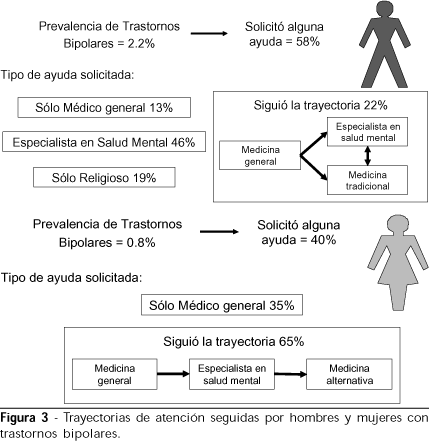OBJECTIVE: To describe the pathways of formal and informal services utilization in urban low income population presenting depressive, dysthymic and bipolar disorders. METHODS: Information was gathered in face to face interviews using a standardized questionnaire that included sections from the Composite International Diagnostic Interview and one section on service utilization. Interviewees (n=1,486) were selected through stratified socioeconomic variables and a random multistep sample of households of Mexico City. RESULTS: A significant proportion of individuals with affective disorders attended at the same time to formal and informal services. It was observed that the majority of individuals established the first contact with a general practitioner (81% of the men with depressive disorders, 100% with dysthymia and 36% with bipolar disorders; 44.4% of the women with depression, 23% with dysthymia and 100% with bipolar disorders). Also, 45% of men with depression, 40% with dysthymia and 65% of the women with bipolar disorders sought help through resources provided by alternative medicines. CONCLUSIONS: The combination of various medical systems has at least two roles: 1) increases the set of care options and thereby maximize healthcare resources available; 2) allows to approaching different aspects of the same illness that a single medical system is unable to meet its complexity.
Mental health services; Mood disorders; Affective disorders; Urban population; Poverty areas; Health services; Interviews; Socio-economic factors




